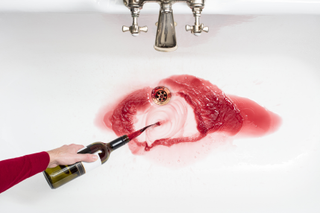How to relax and recharge before Christmas if you've been feeling overwhelmed in December


Looking for tips on how to relax and recharge before Christmas? We've asked mental health and wellness experts for their best practice when it comes to getting through this often overwhelming holiday.
It's been sold as 'the most wonderful time of the year'. Yet for millions out there, Christmas can actually be more of a burden than a joy. The annual holiday and the pressures it brings can negatively affect our mental health and leave us with the signs of anxiety.
Research from the British Association for Counselling and Psychotherapy (BACP) reveals that a fifth of all UK adults feel signs of stress about Christmas this year. Worries include the expectation of presents and wanting people to enjoy the season, to feelings of loneliness or the reminder of a lost loved one. It's important that self care and positive wellbeing remains a priority during this period, which is why these experts have shared their top tips on how to relax and recharge before Christmas.
How to relax and recharge before Christmas:
1. Exercise
Getting a hit of those happy hormones whilst working out is a sure fire way to beat the winter blues and any overwhelmed feelings.
Psychologist Madeleine Gauffin of digital healthcare provider Livi says endorphins released during exercise are effective against managing anxiety long term. "Exercise triggers the release of endorphins that enhance emotional wellbeing," she tells us. "High intensity workouts and aerobic exercise like jogging, running or brisk walking, 2-5 times a week for at least 2 weeks, can be effective in reducing anxiety."

Credit: Getty
She's not wrong either. A 2020 study found that working out lowered depression and a negative mood in healthy but otherwise sedentary adults aged 20-40. While another Polish study noted that it alleviated symptoms such as low self-esteem and social withdrawal.
Yoga sequences in particular are a great exercise with the added benefit of relaxation. Researcher Catherine Woodyard at the University of Mississippi credits a good yoga flow with promoting "recovery from and treatment of addiction, reduce stress, anxiety, depression, and chronic pain, improve sleep patterns, and enhance overall well-being and quality of life."
GoodtoKnow Newsletter
Parenting advice, hot topics, best buys and family finance tips delivered straight to your inbox.
We're fans of More Yoga's specially designed Namasté Inside: Yogis Festive Survival Kit. It contains fabulous at-home yoga flows, mental health workshops and top tips to help you relax and recharge before (and throughout) Christmas.
2. Get Outdoors
Yes, it's darker and gloomier outside at this time of year. But your mind and body will thank you for taking a trek outside the house as nature helps with stress management and anger.
"It can be very easy to suffer with that 'cabin fever' feeling when you're cooped up indoors for too long," says advanced nurse practitioner Cheryl Lythgoe. "So make sure that you encourage your family to get outdoors too. Whether it be for a walk to the local park, a bike ride with the children, or a game of tag around the garden."
The benefits of being outdoors - or 'Ecotherapy' as it's known - are bountiful. As health and wellness expert Penny Weston, tells us it helps people feel "invigorated, energised and ready to face the world again".

Credit: Getty
"Fresh air has been shown to help digest food more effectively, improve blood pressure and heart rate, strengthen the immune system and a whole wealth of other benefits," she adds. "So it’s not surprising that being out in the fresh air makes the mind feel better too."
One 2019 study found that 2 hours (or 120 minutes) a week spent out in nature actively promotes good health and wellbeing. And, this is easily achievable when it equates to approximately 18 minutes a day.
3. Eat a healthy diet
It may sound obvious, but continuing to eat right in December (and not living on a mince pie diet only) will boost your body and mood.
As Benenden Health's Cheryl Lythgoe puts it, "While I would not deny the odd treat or drink over this period, it is important to make sure you are still eating lots of lovely vegetables and fruit in your daily diet to support your immune system and stay healthy."
"Eating the right things will help provide balance and will also help lift your mood, while not causing a crash in energy and mood later," she adds.
Whilst we know that fruit and veggies are plate essentials. There are three important vitamins and minerals to know and include in our diets that boast mind-lifting benefits:
- Vitamin D: "Particular nutrients are critical for healthy brain function, not least vitamin D," says nutritional therapist Lorraine Perretta. "However, dreary weather and less sunlight in the winter months mean our bodies cannot manufacture enough of it." She recommends plenty of oily fish, as this is one of those rich Vitamin D foods. Plus egg yolks and mushrooms like oyster, morel, chanterelle and shiitake. NHS advice is to strive for 10mg a day.
- Vitamin B: Found in nutritional yeast and yeast spread, Lorraine highlights Vitamin B12 as imperative for good mental health. "As it is only naturally available in animal products, vegans are at greater risk of being deficient," she adds. "As are the elderly due to decreased absorption." Treat yourself to a plate of good for you Marmite on toast and reap the rewards.
- Magnesium: "Considered to be the ‘feel good’ mineral, magnesium helps to support a healthy ‘sleep/wake’ cycle and regulate mood," says Lorraine. "Dark green leafy veg, beans and peas, seeds, nuts and wholegrains are all good dietary sources." Or why not introduce magnesium butter into your skincare regime for added perks.
4. Ditch the alcohol
There's many health benefits of not drinking alcohol. And whilst December is the season of Christmas parties and social gatherings, it might pay to reduce or even stop drinking alcohol if you desperately need to relax and recharge before Christmas.
If you suffer from anxiety, try to cut back on alcohol," Dr Sumera tells us, a GP and head of clinical operations at Thriva. "Alcohol also has a huge impact on the quality of your sleep. Whilst it can sometimes act as a sedative and may help you fall asleep, your sleep can subsequently be disrupted and you may wake up in the morning not feeling refreshed."

Giving up alcohol before Christmas may help you relax for the festive season
Her advice? Try to have several alcohol-free days through December and only intake 14 units during a week.
"Opt for lower-strength drinks (check the alcohol by volume (ABV) % on the side of the bottle)," she adds, "Or even try some 'no alcohol' beer or wine instead. You could also choose smaller drinks like a bottle of beer instead of a pint or a small glass of wine instead of a large one."
5. Prioritise sleep
Socialising and increased work loads are significant contributors to many of us getting a lack of sleep during the festive season. The consequence of this means we feel tired, deprived of energy and low in mood.
"You may find your normal sleep patterns become disrupted by the lack of natural light at this time of year," adds the wellbeing experts at CABA. "Eating too much rich food and drinking more alcohol than you’re used to could also mean you’re not getting the quality of deep sleep your body needs."
Try to stick to your usual sleep-wake schedule. This means getting up when your alarm goes in the morning and trying to be in bed around the same time each night.
"If you’re struggling to sleep at night, then try taking a power nap during the day," they recommend. It's not a bad idea, according to research. One 2020 study found that an afternoon nap made participants over 60 more mentally sharp.
If you're finding you can't sleep or find it hard to drift off, consider a soak before hitting the hay. A University of Texas study found that taking a hot bath about 90 minutes before bed could help people nod off quicker.
6. Take time for you
Talking of baths, taking time for yourself is an important task to help us relax and recharge before Christmas.
"Whether this is 15 minutes or an hour, make sure you factor in to be alone," says Carolyne Bennett, an Advanced Law of Attraction coach. "Run a bath with your best bubbles or lavender oil, light some candles and try to relax. If baths don’t do it for you, sit in a quiet room and read a book. Or go for a walk alone."
The wellbeing experts at CABA agree that it's "easy to fill up your calendar" with many social gatherings at this time of year. "Remember, it's ok to say no," they tell us.
They also recommend listening to music "as it’s been found to have a calming effect on the brain". And they're not wrong either. One 2017 study by Dr. David Lewis-Hodgson of Mindlab International claimed it can decrease anxiety and stress levels by up to 65%.
The neuroscientist even went further by sharing the most effective track from the study. 'Weightless' was so effective, many women became drowsy and I would advise against driving while listening to the song because it could be dangerous," said Dr Lewis-Hodgson.
Creating a special calming playlist on Spotify or Apple. Or similarly, listen to free nature sounds from sites like moodil.com and calmsound.com.
7. Stay off social media
Social media isn't always our friend as we well know. Those idyllic (and often staged or edited) representations of the perfect Christmas can add to our festive funk and the pressure to get things right.
One study in the Journal of Social and Clinical Psychology looked at a group of Facebook users and found that depressive symptoms arose due to "social comparison". Something that's perhaps more commonly known as the 'their life looks better than mine' thought quandry.
"Social media can be overwhelming," agrees Barbara Santini, a psychologist at dimepiecela. "To avoid ruining your Christmas, delete the apps to stay off for a while."
A digital detox should also include not checking your emails. This will allow you to properly disconnect from work and relax and recharge before Christmas and throughout the break.
8. Practice mindfulness
Mindfullness or gratitude meditation can help you relax and recharge before Christmas. It's a method that actively encourages clearing the mind and banishing harmful thoughts.
"It might seem to be the buzzword doing the rounds on internet forums and self-help Youtube channels, but it really does work," says Benenden Health's matron Cheryl. "Mindfulness is a way of being fully present and ‘in-the-moment’. This is a great way to start the day relaxed and stress free, search for some fabulous videos on You Tube to get you started."
Popular videos to check out include Goodful's meditation playlist which has 5,10 or 15 minute ones to help suit you and your schedule. "I’m a huge fan of Headspace," says Hannah Samano, founder of menstrual wellbeing site Unfabled. "Just 5 minutes with a guided mindfulness meditation from the app helps us to feel much more calm. It helps me become more self-aware and in-tune with how I’m feeling."
Part of your mindfullness practice may involve positive visualisation instead. And this should include realistic expectations of how Christmas will go too, says wellness coach Carolyn Bennett:
"It may feel strange, but science has proven that if you think positive, you will experience positive outcomes. You may naturally worry about Christmas Day thinking; ‘what if I burn the turkey’, ‘what if people arrive late’, ‘what if we argue’. But try and flip these statements to positives like 'what if the Christmas meal turns out to be really good’ and ‘what if we all laugh together’.
"As part of your visualisation, remind and prepare yourself not to set expectations on how people will behave," she adds. "Focus on some of their positive points. Do your best to accept them for who they are and not what you want them to be."
9. Breathe
When anxiety is at it's peak, the best thing you can do is take it back to basics and just focus on breathing right.
“There are a number of tools you can use to cope in the moment when your anxiety feels overwhelming," says pyschologist Madeleine Gauffin. "I recommend this simple breathing exercise to help calm your nervous system and reduce stress in your body":
- Sit or lie down comfortably
- Exhale completely
- Gently and slowly inhale through your nose for the count of 4
- Gently exhale through your mouth for the count of 4
- Pause and hold for the count of 4
"As you breathe, imagine your breath moving around the image of a square," adds Madeleine. "Repeat for 1 or 2 minutes, or until you feel calmer."
Breathing exercises for anxiety like this are great to have in your pocket for when flare-ups occur. But, if this is a frequent occurrence for you then seeking medical and professional help is strongly recommended.

Getty
10. Talk to a Therapist
Voicing your overwhelmed thoughts and feelings to a professional is one of the best things you can do to prioritise your mental health. Whatever time of year.
“Starting therapy ahead of the holiday season, instead of waiting to begin therapy in the New Year, could help to relieve some of this seasonal stress and support people with what can be a difficult time," says Philip Karahassan, a counsellor registered with the British Association for Counselling and Psychotherapy (BACP).
"The anxieties people face at Christmas can vary from the difficulties surrounding hosting family and friends and the pressures to make them enjoy it. To feelings of grief, loss, loneliness, sadness and dread. Talking to a therapist to help cope ahead of Christmas should never be a taboo topic."
You can locate your nearest therapist via the BACP's website with this handy search tool.
Video of the Week:

Emily Stedman is the former Features Editor for GoodTo covering all things TV, entertainment, royal, lifestyle, health and wellbeing. Boasting an encyclopaedic knowledge on all things TV, celebrity and royals, career highlights include working at HELLO! Magazine and as a royal researcher to Diana biographer Andrew Morton on his book Meghan: A Hollywood Princess. In her spare time, Emily can be found eating her way around London, swimming at her local Lido or curled up on the sofa binging the next best Netflix show.
-
 Why do I crave sugar? Causes of sugar cravings and how to stop them
Why do I crave sugar? Causes of sugar cravings and how to stop themIf you're someone who suffers from sugar cravings you'll know how hard it is to give up the sweet stuff. But you're not alone.
By Debra Waters Published
-
 Low sodium diet: the benefits of reducing salt and what foods to eat
Low sodium diet: the benefits of reducing salt and what foods to eatBy Emily-Ann Elliott Published
